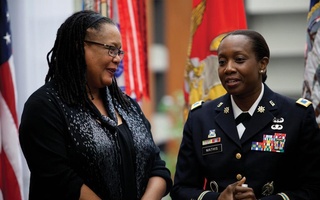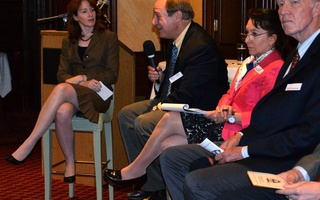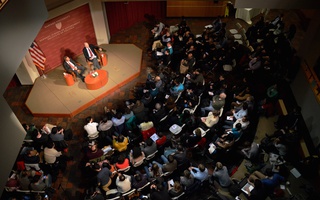UPDATED: March 22, 2012, at 4:13 a.m.
In the latest step to reverse the more-than-40-year exclusion of the military from Harvard Yard, the University announced Wednesday that it has signed an agreement with the U.S. Army to formally recognize the Army Senior Reserve Officers’ Training Corps. The recognition follows the return of Naval ROTC to campus last year.
“This is a welcome step in the long and distinguished history of military service by members of the Harvard community,” University President Drew G. Faust said in a statement. “At Harvard, military service is rightly regarded as public service, and I am pleased that we can now broaden access for our students to the leadership and learning opportunities that Army SROTC training provides.”
As part of the agreement, Harvard will financially back student participation in the program and provide Army SROTC with access to classroom space on Harvard’s campus.
While students will continue to take their primary Army SROTC classes at the Massachusetts Institute of Technology, an MIT military science professor will offer office hours open to Army SROTC cadets on Harvard’s campus. Further, Harvard’s Army SROTC will have office space in the Student Organization Center at Hilles.
Once the program moves into its new SOCH office space later this semester, Harvard will host a ceremony in honor of the agreement with Army SROTC.
The University welcomed the Naval Reserve Officers’ Training Corps back to campus last year soon after the repeal of “Don’t Ask, Don’t Tell,” the policy banning gays and lesbians from openly serving in the military that Harvard administrators had condemned as antithetical to the University’s anti-discrimination policy.
Discussions between the University and the Air Force are still ongoing.
Members of the Harvard queer community have expressed concern that the University’s decision to recognize ROTC remains a violation of its non-discrimination policy even after the fall of “Don’t Ask, Don’t Tell.” Currently, the military does not allow trans and intersex individuals to enlist, as it considers gender identity disorder—the psychological classification that describes transgenderism—and intersexism to be medical disqualifications.
Jia Hui Lee ’12, a former member of the Trans Task Force. said that the administration had invited the Trans Task Force to the official recognition ceremony for Army SROTC—a gesture he said he appreciated. But he said that he was still frustrated by the administration’s lack of communication during the process.
“I respect the decision to bring the Army in addition to NROTC back to Harvard’s campus, but I think the administration needs to recognize that that decision is a compromise,” Lee said.
Despite these complaints, Faust, along with Harvard alumni, remains steadfast in her support of the return of ROTC.
David M. Silverman ’53, a member of the steering committee of Advocates for Harvard ROTC, said he thought it was “a shame” that Harvard had ever expelled ROTC from its campus.
“I feel that universal training in some aspect of government service should never have been dropped,” Silverman said. “It’s finally going in the right direction after years going in the wrong the direction.”
Harvard Kennedy School professor David R. Gergen called the return of Army SROTC to Harvard a “welcome step forward.” Gergen, an adviser in the Clinton White House, has consistently praised Faust’s leadership during the transition.
Read more in News
Harvard Begins Planning for AllstonRecommended Articles
-
 With Ceremony, Army ROTC Moves In to the Quad
With Ceremony, Army ROTC Moves In to the Quad -
 Army ROTC Training Returns to Harvard
Army ROTC Training Returns to Harvard -
 Student Service Members Facilitate Conversations for Veterans
Student Service Members Facilitate Conversations for Veterans -
HKS Panel Encourages Religion in the Public SphereChristian author Jim Wallis and Memorial Church Minister Jonathan L. Walton argued that the public should harness the power of religion to pursue the “common good” in politics on Monday in an event hosted by the Harvard Kennedy School’s Center for Public Leadership.
-
Hauser Center To Be Renamed, Merged into Center for Public LeadershipThe Kennedy School announced this past week that it will merge two of its research centers. Beginning July 1, the Hauser Center for Nonprofit Organizations will be renamed the Hauser Institute for Civil Society and operate within the Center for Public Leadership, bringing together the research and leadership development efforts of the two bodies.
-
 U.S. Recovery Unsatisfactory, Summers Says at IOP
U.S. Recovery Unsatisfactory, Summers Says at IOP













